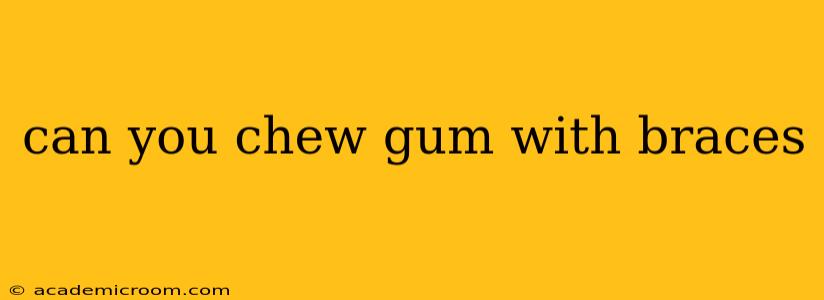Can You Chew Gum with Braces? A Comprehensive Guide
Chewing gum with braces is a question many orthodontic patients ask. The short answer is: it's generally not recommended. While it might seem like a harmless habit, chewing gum can actually cause several problems for your braces and overall orthodontic treatment. Let's delve into the specifics.
What Happens When You Chew Gum with Braces?
The sticky nature of chewing gum is the primary culprit. It can easily adhere to your braces, trapping food particles and increasing the risk of plaque buildup. This can lead to:
- Increased risk of cavities and gum disease: The trapped food particles provide a breeding ground for bacteria, increasing your chances of developing cavities and gum disease (gingivitis or periodontitis). This can not only damage your teeth but also potentially affect your orthodontic treatment timeline.
- Broken or loosened brackets: The force exerted while chewing gum, especially tougher varieties, can put significant stress on your brackets and wires. This can lead to brackets breaking off or wires becoming loose, requiring a visit to your orthodontist for repairs. This disrupts your treatment plan and can potentially prolong the overall time needed to straighten your teeth.
- Damage to the archwire: The sticky residue from gum can also interfere with the movement of the archwire, impeding the progress of your orthodontic treatment. This subtle interference, over time, can add unwanted delays.
- Discomfort and irritation: Chewing gum can also cause irritation to your gums and cheeks due to the constant rubbing against the brackets and wires.
What Types of Gum Are Worse for Braces?
All types of gum pose a risk, but some are worse than others. Sugar-free gum might seem like a better option, but the stickiness remains a significant problem. Chewing gum that's exceptionally hard or chewy will exert more force on your braces, increasing the risk of damage.
What are the Alternatives to Chewing Gum?
If you're looking for something to freshen your breath or satisfy a chewing urge, there are several safer alternatives:
- Sugar-free mints or breath strips: These offer a refreshing taste without the sticky residue of gum.
- Chewing on sugar-free xylitol gum (with caution): Some orthodontists might allow sugar-free xylitol gum in moderation, but it's crucial to discuss this with your orthodontist first, as even xylitol gum can still pose some risks.
Can I Chew Sugar-Free Gum with Braces?
While sugar-free gum might seem like a less harmful option due to the lack of sugar, the sticky texture still presents significant risks as mentioned above. It's best to avoid all types of gum to prevent complications with your braces.
How Often Should I See My Orthodontist While Wearing Braces?
Regular check-ups with your orthodontist are crucial throughout your orthodontic treatment. These appointments allow your orthodontist to monitor your progress, address any issues that may arise, and make necessary adjustments to your braces. The frequency of these appointments will be determined by your orthodontist based on your individual treatment plan.
In conclusion, while the temptation to chew gum might be strong, it's best to avoid it entirely while you have braces. The risks of damage to your braces and potential harm to your teeth far outweigh any benefits. Discuss any concerns about alternatives with your orthodontist for personalized advice.
